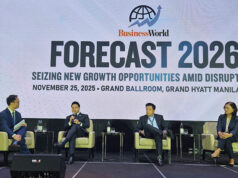By Jenina P. Ibañez
SUSTAINABILITY efforts can help boost the value of companies, according to speakers at the 17th Management Association of the Philippines (MAP) International CEO Conference on Tuesday.
“The trend overall is that more sustainable companies outperform on the stock market,” PwC South East Asia Sustainability and Climate Change Leader Andrew WK Chan said at the forum.
A sustainable company is one that minimizes its negative impact on the environment and society, as it considers not just short-term profit but long-term value.
Mr. Chan said investors now look at how sustainability initiatives create improved cost-saving, risk management, and brand reputation.
“[Investors] would take a broader lens across the region and see which companies are doing better when it comes to sustainability performance. Not just the disclosures the SEC (Securities and Exchange Commission) is asking for — but are companies actually getting deeper into the quality of disclosures such that investors are able to see how that is actually impacting the performance of the company,” Mr. Chan said in an interview after his speech.
Publicly listed companies are required to submit to the SEC sustainability reports which detail the economic, environmental, and societal impact of their businesses.
Companies that are not prepared for climate change face greater risk.
“From today to 2070, the risk of your business being damaged or destroyed by climate change is going to rise by 70%. And this volatility in climate change is affecting your business in many ways. The volatility is going to affect your corporate rating. It’s going to affect the loans you will get from the banks,” Gate International Ltd. President Henry K. H. Wang said.
“Environmental costs for industries globally are rising tremendously. This is expected to double every 14 years, so you better budget for that,” he added.
Mr. Wang described the extreme weather events in the country, and quoted the World Health Organization in describing how climate events could cost the Philippines 2% of its GDP.
Mr. Chan said that there are still challenges in persuading businesses to measure and adopt sustainable practices.
“My concern is perception — perception that sustainability costs more money. Because the perception is that ‘we’ve got to now do disclosure, I need to allocate FTE (full-time equivalent) headcount to actually respond to these requirements,’ as opposed to taking the mindset that actually, there’s a lot of business value to be generated if I do this in the right way,” he said.
The recent PwC MAP CEO survey found that the biggest concern of CEOs in adopting more sustainable practices is high transition costs, followed by inadequate technology and the economic viability of sustainable practices.
For Mr. Chan, businesses must measure impact, not just on shareholders, but also in terms of social benefit — to stakeholders. He said that the ability to manage sustainability risks is noted by both investors and bank creditors.
He observed that in South East Asia, businesses are assigning sustainability requirements to corporate communications teams. He recommends that companies incorporate sustainability into their overall strategy.



